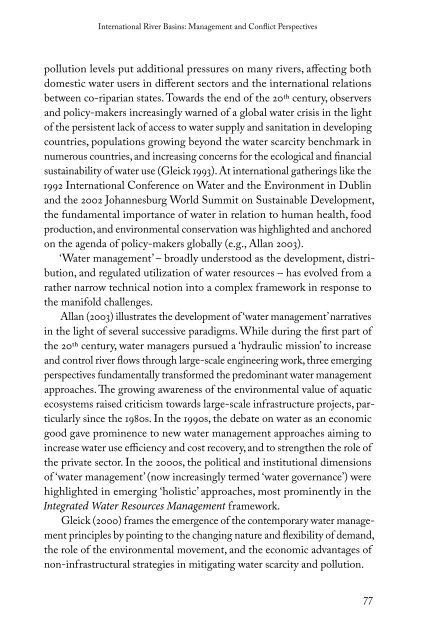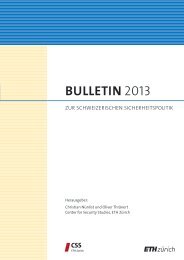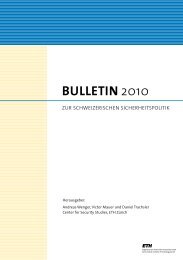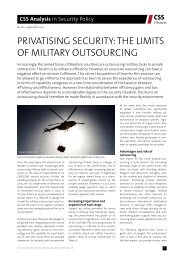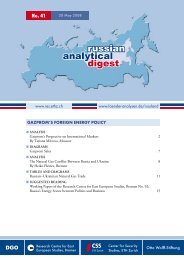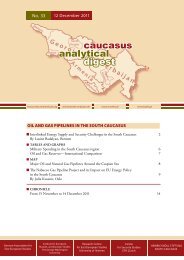Double-Edged Hydropolitics on the Nile - Center for Security Studies ...
Double-Edged Hydropolitics on the Nile - Center for Security Studies ...
Double-Edged Hydropolitics on the Nile - Center for Security Studies ...
Create successful ePaper yourself
Turn your PDF publications into a flip-book with our unique Google optimized e-Paper software.
Internati<strong>on</strong>al River Basins: Management and C<strong>on</strong>flict Perspectives<br />
polluti<strong>on</strong> levels put additi<strong>on</strong>al pressures <strong>on</strong> many rivers, affecting both<br />
domestic water users in different sectors and <strong>the</strong> internati<strong>on</strong>al relati<strong>on</strong>s<br />
between co-riparian states. Towards <strong>the</strong> end of <strong>the</strong> 20th century, observers<br />
and policy-makers increasingly warned of a global water crisis in <strong>the</strong> light<br />
of <strong>the</strong> persistent lack of access to water supply and sanitati<strong>on</strong> in developing<br />
countries, populati<strong>on</strong>s growing bey<strong>on</strong>d <strong>the</strong> water scarcity benchmark in<br />
numerous countries, and increasing c<strong>on</strong>cerns <strong>for</strong> <strong>the</strong> ecological and financial<br />
sustainability of water use (Gleick 1993). At internati<strong>on</strong>al ga<strong>the</strong>rings like <strong>the</strong><br />
1992 Internati<strong>on</strong>al C<strong>on</strong>ference <strong>on</strong> Water and <strong>the</strong> Envir<strong>on</strong>ment in Dublin<br />
and <strong>the</strong> 2002 Johannesburg World Summit <strong>on</strong> Sustainable Development,<br />
<strong>the</strong> fundamental importance of water in relati<strong>on</strong> to human health, food<br />
producti<strong>on</strong>, and envir<strong>on</strong>mental c<strong>on</strong>servati<strong>on</strong> was highlighted and anchored<br />
<strong>on</strong> <strong>the</strong> agenda of policy-makers globally (e.g., Allan 2003).<br />
‘Water management’ – broadly understood as <strong>the</strong> development, distributi<strong>on</strong>,<br />
and regulated utilizati<strong>on</strong> of water resources – has evolved from a<br />
ra<strong>the</strong>r narrow technical noti<strong>on</strong> into a complex framework in resp<strong>on</strong>se to<br />
<strong>the</strong> manifold challenges.<br />
Allan (2003) illustrates <strong>the</strong> development of ‘water management’ narratives<br />
in <strong>the</strong> light of several successive paradigms. While during <strong>the</strong> first part of<br />
<strong>the</strong> 20th century, water managers pursued a ‘hydraulic missi<strong>on</strong>’ to increase<br />
and c<strong>on</strong>trol river flows through large-scale engineering work, three emerging<br />
perspectives fundamentally trans<strong>for</strong>med <strong>the</strong> predominant water management<br />
approaches. The growing awareness of <strong>the</strong> envir<strong>on</strong>mental value of aquatic<br />
ecosystems raised criticism towards large-scale infrastructure projects, particularly<br />
since <strong>the</strong> 1980s. In <strong>the</strong> 1990s, <strong>the</strong> debate <strong>on</strong> water as an ec<strong>on</strong>omic<br />
good gave prominence to new water management approaches aiming to<br />
increase water use efficiency and cost recovery, and to streng<strong>the</strong>n <strong>the</strong> role of<br />
<strong>the</strong> private sector. In <strong>the</strong> 2000s, <strong>the</strong> political and instituti<strong>on</strong>al dimensi<strong>on</strong>s<br />
of ‘water management’ (now increasingly termed ‘water governance’) were<br />
highlighted in emerging ‘holistic’ approaches, most prominently in <strong>the</strong><br />
Integrated Water Resources Management framework.<br />
Gleick (2000) frames <strong>the</strong> emergence of <strong>the</strong> c<strong>on</strong>temporary water management<br />
principles by pointing to <strong>the</strong> changing nature and flexibility of demand,<br />
<strong>the</strong> role of <strong>the</strong> envir<strong>on</strong>mental movement, and <strong>the</strong> ec<strong>on</strong>omic advantages of<br />
n<strong>on</strong>-infrastructural strategies in mitigating water scarcity and polluti<strong>on</strong>.<br />
77


